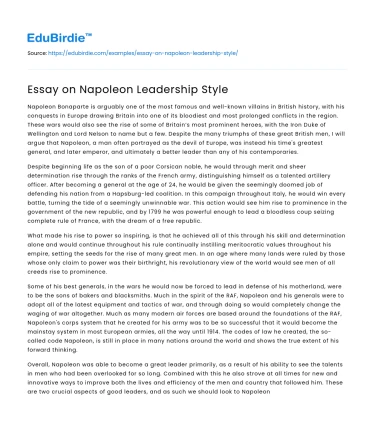Napoleon Bonaparte is arguably one of the most famous and well-known villains in British history, with his conquests in Europe drawing Britain into one of its bloodiest and most prolonged conflicts in the region. These wars would also see the rise of some of Britain’s most prominent heroes, with the Iron Duke of Wellington and Lord Nelson to name but a few. Despite the many triumphs of these great British men, I will argue that Napoleon, a man often portrayed as the devil of Europe, was instead his time's greatest general, and later emperor, and ultimately a better leader than any of his contemporaries.
Despite beginning life as the son of a poor Corsican noble, he would through merit and sheer determination rise through the ranks of the French army, distinguishing himself as a talented artillery officer. After becoming a general at the age of 24, he would be given the seemingly doomed job of defending his nation from a Hapsburg-led coalition. In this campaign throughout Italy, he would win every battle, turning the tide of a seemingly unwinnable war. This action would see him rise to prominence in the government of the new republic, and by 1799 he was powerful enough to lead a bloodless coup seizing complete rule of France, with the dream of a free republic.
Save your time!
We can take care of your essay
- Proper editing and formatting
- Free revision, title page, and bibliography
- Flexible prices and money-back guarantee
What made his rise to power so inspiring, is that he achieved all of this through his skill and determination alone and would continue throughout his rule continually instilling meritocratic values throughout his empire, setting the seeds for the rise of many great men. In an age where many lands were ruled by those whose only claim to power was their birthright, his revolutionary view of the world would see men of all creeds rise to prominence.
Some of his best generals, in the wars he would now be forced to lead in defense of his motherland, were to be the sons of bakers and blacksmiths. Much in the spirit of the RAF, Napoleon and his generals were to adopt all of the latest equipment and tactics of war, and through doing so would completely change the waging of war altogether. Much as many modern air forces are based around the foundations of the RAF, Napoleon's corps system that he created for his army was to be so successful that it would become the mainstay system in most European armies, all the way until 1914. The codes of law he created, the so-called code Napoleon, is still in place in many nations around the world and shows the true extent of his forward thinking.
Overall, Napoleon was able to become a great leader primarily, as a result of his ability to see the talents in men who had been overlooked for so long. Combined with this he also strove at all times for new and innovative ways to improve both the lives and efficiency of the men and country that followed him. These are two crucial aspects of good leaders, and as such we should look to Napoleon when we think of a great leader.






 Stuck on your essay?
Stuck on your essay?

